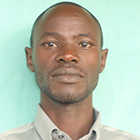PhD Project
Identification of feeding substrates and optimization of production of black soldier fly larvae (Hermetia illucens, L) for fish feed formulation
 Mr. Nyakeri Evans Manyara
Mr. Nyakeri Evans Manyara
MSc Biotechnology
Jomo Kenyatta University of Agriculture and Technology
Kenya
Evans graduated from Egerton University with a Bachelor of Education (Science) degree (Botany, Zoology and chemistry options) and a Master of Science in Biotechnology from Jomo Kenyatta University of Agriculture and Technology, Juja, Kenya in 2013.
With a growing world population and increasingly demanding consumers, the production of sufficient protein represents a serious challenge for the future. The demand for proteins, especially fish and chicken in Kenya is beyond supply, partly due to high levels of poverty in areas where fish is a cheaper source of protein than other conventional alternatives, rising incomes and improved lifestyles. The deficit has resulted in the skyrocketing of the price of proteins beyond the rich of the majority of the populace, and is felt in the form of malnourishment and poor child development in many rural areas and urban slums of the country.This is despite the fact that insects have a great potential to alleviate and reverse this sorry state of affairs. The black soldier fly larvae (Hermetiaillucens) for instance has, a crude protein content average of42%, a lipid content that includes the healthy unsaturated fatty acids is approximately 38%and the immune boosting contents of the chitin in their exoskeleton. Additionally, studies have found the possibility of further enhancing the unsaturated fatty acid content in the BSF biomass by substrate manipulation and enrichment. BSF larvae also have an as yet unexploited potential for bioconversion of environmental wastes in the Kenya.These ubiquitous insects can therefore be tremendously useful.
Granted, the consumption of insects, especially BSF is not so popular in the country. However it’s a natural and accepted occurrence in chicken and poultry in the wild, which does not affect the quality, taste and acceptance of their meat product.
This PhD study seeks to exploit the potential of the Black Soldier Fly larvae to feed on agricultural organic waste substrates and convert them into useful biomass for the feed of chicken and fish.The BSF biomass will replace the use of the scarce, expensive and dwindling sources of fishmeal and oil in feeds, when combined with other locally available ingredients to formulate a fish and chicken feed. For Kenyans this will free the use of “omena” and the Nile perch in feeds; increase the amount of fish available for human consumption and eventually make fish affordable to the majority of the local populace.
Supervisors
Prof. Monicah Ayieko, Prof. Amimo Fred, Dr. Ogola Henry
Download PhD thesis
 PhD by PhD by Nyakeri Evans Manyara: Identification of Feeding Substrates and Optimization of Production of Black Soldier Fly Larvae (Hermetia Illucens, L) for Fish Feed Formulation.
PhD by PhD by Nyakeri Evans Manyara: Identification of Feeding Substrates and Optimization of Production of Black Soldier Fly Larvae (Hermetia Illucens, L) for Fish Feed Formulation.
